|
|
|
Sort Order |
|
|
|
Items / Page
|
|
|
|
|
|
|
| Srl | Item |
| 1 |
ID:
020402
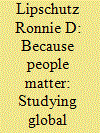

|
|
|
|
|
| Publication |
Nov 2001.
|
| Description |
321-339
|
|
|
|
|
|
|
|
|
|
|
|
|
|
|
|
| 2 |
ID:
116848


|
|
|
|
|
| Publication |
2012.
|
| Summary/Abstract |
This article engages with critical ipe scholars who have examined the rise of China and its impact on the neoliberal world order by analysing whether China poses a challenge to the neoliberal norm of free movement of capital. We argue that China's capital control regime is marked by a contradiction between its domestic social relations of production and its global geo-economic ambitions. On one hand, the key raison d'être of China's capital controls is to protect and consolidate an investment-led accumulation regime that redistributes income and wealth from Chinese workers to its state-owned enterprise sector. Dismantling these controls would result in changing social relations of production that would not necessarily benefit Chinese industrial and financial capital. On the other hand, China's accumulation regime has found itself increasingly constrained by the dynamics of US monetary hegemony, making the contestation of US structural monetary power a key global geo-economic ambition of China's ruling elites. In this regard, China would have to challenge the dominance of the US dollar by promoting the international role of the renminbi and developing liquid financial markets. Since it would have to abolish its capital controls in order to achieve this, there is a plain contradiction between its domestic and global objectives. A good understanding of this contradiction is necessary in order to be able to assess whether China will be capable of challenging the neoliberal world order in general and the norm of free movement of capital in particular.
|
|
|
|
|
|
|
|
|
|
|
|
|
|
|
|
| 3 |
ID:
178321
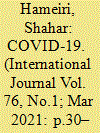

|
|
|
|
|
| Summary/Abstract |
Lockdowns and border closures to manage the ongoing COVID-19 pandemic have caused the greatest global economic shock since the Great Depression. Does this also signal the end of economic globalization, the most significant trend of the past forty years? And if so, what kind of global political economy is emerging from the wreckage? In this article, I argue that COVID-19 is mainly intensifying pre-existing trends, set in motion by the global financial crisis of 2008 and the People’s Republic of China (PRC)’s economic rise. The disruptions to global supply chains wrought by COVID-19 have combined with rising United States–PRC rivalry, growing disaffection with the distributional impacts of global value chains, and automation to catalyze the turn away from globalized production. Meanwhile, amid the economic doom and gloom, financial markets are booming, high on the central banks’ liquidity injections to which they have been addicted since the 2008 crisis. As in the decade since the 2008 crisis, booming markets will likely deepen inequality and resentment, fuelling economic nationalism and eroding support for globalization even more. The governments of relatively small and open economies, such as Australia and Canada, will need to guide their economies more purposefully or find themselves at the mercy of the increasingly confrontational, yet domestically fragile, United States and the PRC.
|
|
|
|
|
|
|
|
|
|
|
|
|
|
|
|
| 4 |
ID:
124453
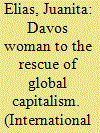

|
|
|
|
|
| Publication |
2013.
|
| Summary/Abstract |
The World Economic Forum (WEF) is a global governance actor that has in recent years taken an increased interest in issues pertaining to gender equality and women's empowerment. The paper critically investigates the work of the WEF in this area, suggesting that WEF-produced gender and development discourse is profoundly compatible with the politics and practices of neoliberalism-not least in the way in which it aligns gender equality and women's empowerment with national economic competitiveness. This is, furthermore, a distinctly postfeminist reading of gender that rests upon the production of neoliberal-compatible female subjectivities-such as "rational economic woman" or "Davos woman"-who emerge as those in society best able to deliver fair and sustainable economic growth (effectively rescuing global capitalism from the excesses of hypermasculine crisis capitalism). The framing of the case for gender equality and women's empowerment in these terms is powerful and may well be an effective way for gender advocates to present their demands. But by analyzing not only how the WEF has framed/represented gender issues but also what has been left out of this representation, the paper points to the way in which simplistic representations concerning the contribution that women make to economic competitiveness disguise the double burdens and gendered structures of socioeconomic inequality that are central to the widening and deepening of the market into all spheres of social life under conditions of roll-back neoliberalism.
|
|
|
|
|
|
|
|
|
|
|
|
|
|
|
|
| 5 |
ID:
134087
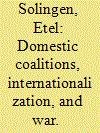

|
|
|
|
|
| Publication |
2014.
|
| Summary/Abstract |
Recent commentary on the centenary of World War I evokes similarities between Germany then and China now, and between globalization then and now. The nature of dominant coalitions in both countries provides a conceptual anchor for understanding the links between internal and external politics in 1914 and 2014. Coalitional dynamics draw greater attention to agency in debates that all too often emphasize structure, impersonal forces, and inevitability. Two core claims rest on this basic analytical building block. First, despite apparent similarities in domestic coalitional arrangements of putative revisionist challengers-Germany and China-important differences defy facile analogies. China now is not Germany then. Second, the regional coalitional cluster and the global political economy-and hence the links between domestic and external politics-differ across the two periods. The "world-time" against which coalitions operate today is significantly different as well. Thus ahistorical analogies between then and now may not only be imperfect; they can infuse actors with misguided and perilous protocols for international behavior. There is plenty that may recall World War I today but even more that does not, and all must make sure that gap never narrows.
|
|
|
|
|
|
|
|
|
|
|
|
|
|
|
|
| 6 |
ID:
146483
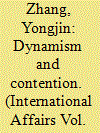

|
|
|
| 7 |
ID:
094029
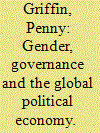

|
|
|
|
|
| Publication |
2010.
|
| Summary/Abstract |
This article considers a range of governance actors (including also the role of political enquiry into the global political economy in and of itself) to analyse how neo-liberal governance strategies seek to socialise human bodies (female, male or otherwise) into a global system of neo-liberal economic productivity. Contemporary mechanisms of global governance, it is suggested, seek to engineer a capitalist 'market society' while claiming to 'empower' poor people. In recent years, 'empowerment' rhetoric in global governance has increasingly depended on measuring the 'economic' role(s) of women in developing countries, judging their contributions productive only where they can be gauged to directly contribute to 'formal economy' growth. Reinforcing the assumption that 'formal' contributions are the only contributions worth measuring, such rhetoric simultaneously eradicates all other (non-competitive and/or non-entrepreneurial) behavioural possibilities for women, while clearly excluding all those who are not 'women'. Against the instrumentalisation of gender (as a category pertaining only to women and studies of women), this article argues that gender in global governance means much more than simply describing whether people are male or female and quantifying their productive capacities accordingly. As a broad and complex category of analysis, gender enriches the dynamism both of our studies of and practices in the global political economy. To ignore gender's role in the global political economy is to fail to see the power that gender (as a composite part of the relations of power that drive systems of economic development and growth) brings to our everyday understandings, and especially to our understandings of economic 'common sense'.
|
|
|
|
|
|
|
|
|
|
|
|
|
|
|
|
| 8 |
ID:
130566
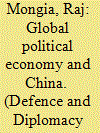

|
|
|
| 9 |
ID:
162018
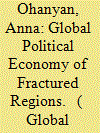

|
|
|
|
|
| Summary/Abstract |
Despite ebbs and flows in comparative regional studies over the past few decades, the regional dimension of world politics is gaining sustained attention from scholarly and policymaking communities. Thus far much of the focus has been on regional integration, which is traditionally viewed as a necessary condition for economic development and security provision. This article describes the problem of regional fracture in conflict regions; it delineates the political and economic dimensions of regional fracture; and examines the security implications of each. It examines the problem of fractured regions in Russia’s post-Soviet neighborhoods, the Balkans, and sub-Saharan Africa. The article concludes with implications for security policy as exercised by the West in the post-American world.
|
|
|
|
|
|
|
|
|
|
|
|
|
|
|
|
| 10 |
ID:
101742
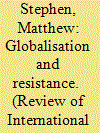

|
|
|
|
|
| Publication |
2011.
|
| Summary/Abstract |
This article develops and applies the role of 'common sense' in a Gramscian theory of transnational counter-hegemony. Building on recent interpretative literature on the alter-globalisation movement, it applies this framework to then evaluate empirically the impact of the alter-globalisation movement on the realm of global 'common sense' understandings of the world in the period 2002 to 2007. It shows that there is little empirical support for the notion that the alter-globalisation movement effected a legitimation crisis for neo-liberalism as a hegemonic project on a global scale. Instead, a more ambivalent and potentially reactionary situation amongst collectively held norms is revealed. This indicates the shortcomings of the alter-globalisation movement as a coalition of social forces capable of mounting an ideological attack on neo-liberalism and forging a new intellectual-moral bloc.
|
|
|
|
|
|
|
|
|
|
|
|
|
|
|
|
| 11 |
ID:
110286
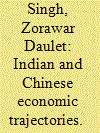

|
|
|
| 12 |
ID:
151210
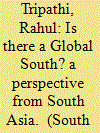

|
|
|
|
|
| Summary/Abstract |
Much of the writings on the Global South in recent years have focused on the role that some of the emerging economies within the developing world might play in the unfolding global scenario. It is asserted that the rise of a group of middle-level players, given their economic and political profile in global affairs, may be critical in shaping future global outcomes. Such an influence may come at a time when the power of the established powers is seen in relative decline, particularly given the volatility of the global political economy in recent years. The article tries to revisit this assumption from a South Asian perspective and tries to explore the fundamentals of the Global South in terms of its ability to provide alternatives. Taking South Asia as a test case, the article argues that the term ‘South’ itself as a homogeneous entity is problematic from the point of view of characterisation as well as actualisation of the potential alternatives. While this does not rule out coalition building and collective action between countries sharing common interests and objectives, such coalition building may be more diffused and episodic rather than have the potential to provide ‘alternative orders’.
|
|
|
|
|
|
|
|
|
|
|
|
|
|
|
|
| 13 |
ID:
121582
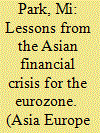

|
|
|
|
|
| Publication |
2013.
|
| Summary/Abstract |
This paper comparatively examines diverse responses from three major actors in the global political economy (the state, civil society, international financial institutions) to the Asian financial crisis of 1997 and the current eurozone crisis. First, it analyses conditional lending policies of international financial institutions (IFIs) such as the International Monetary Fund toward countries in fiscal distress. It then critically examines how the lending policies engendered social tensions and conflicts as austerity measures such as cuts to social welfare programmes hit hard on the populace. Examining how the state and civil society in Asia reacted to and, as a result of contentious state-civil society interactions, altered the policies of IFIs, the paper draws lessons from the Asian financial crisis for the European Union and puts forwards alternative policy suggestions.
|
|
|
|
|
|
|
|
|
|
|
|
|
|
|
|
| 14 |
ID:
109862
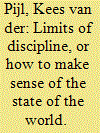

|
|
|
| 15 |
ID:
114986
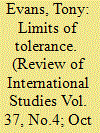

|
|
|
|
|
| Publication |
2011.
|
| Summary/Abstract |
Following recent acts of terrorism in many parts of the world, Islam has become an object of fear. While the threat of violence is undoubtedly an element that inspires this fear, Islam's counter-hegemonic threat is not limited to violence alone. Given its 1.2 billion following, Islam also offers a challenge to the central values that describe the dominant neo-liberal world order, particularly those values that legitimate the global political economy. Although tolerance is an important value in liberal thought, tolerance cannot be exercised where counter-hegemonic threats include challenges to the central tenets of liberalism. This article argues that the current fear of Islam is motivated by just such a challenge. By looking at four central concepts where liberal and Islamic thought diverge - reason and revelation, private property, rights and duties, and government and state - this article seeks to gain a more nuanced insight into current attitudes towards Islam and the fear of counter-hegemony.
|
|
|
|
|
|
|
|
|
|
|
|
|
|
|
|
| 16 |
ID:
087027
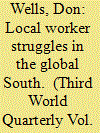

|
|
|
|
|
| Publication |
2009.
|
| Summary/Abstract |
The offshoring of production from the global North to the South has been crucial to the 'race to the bottom' in global labour standards. The corporate social responsibility (CSR) policies of Northern transnational corporations-particularly their 'corporate codes of conduct'-have received much attention for their putative function of limiting this race by regulating labour standards in Southern workplaces. Similar attention has been given to campaigns by Northern anti-sweatshop 'transnational advocacy networks' (TANs) in promoting enforcement of labour standards in the South. However, evidence suggests that these CSR policies have little effect on labour standards enforcement, and that this ineffectiveness is embedded in structural constraints in the global political economy. Case studies of the role of the anti-sweatshop TANs suggests that, while they have provided important support to local worker struggles in the South, that support is less central than has often been understood. Instead, local workers, their organisations and community allies in the South have played more pivotal roles in this 'globalisation from below'.
|
|
|
|
|
|
|
|
|
|
|
|
|
|
|
|
| 17 |
ID:
154788
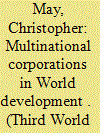

|
|
|
|
|
| Summary/Abstract |
In light of the 2014 Ecuador-sponsored resolution at the UN Human Rights Council to examine the link between Transnational Corporations and Human Rights, in this paper I review the first major discussion at the United Nations of the role of multinational corporations. The report on Multinational Corporations in World Development (1973) for the UN Department of Economic and Social affair launched the (then) new UN Centre on Transnational Corporations. I examine the report in some detail, compare and contrast this with the Ecuadorian resolution from 2014, and reflect on the continuities and changes in attempts to regulate the conduct of global corporations over the 40 years between these two moments.
|
|
|
|
|
|
|
|
|
|
|
|
|
|
|
|
| 18 |
ID:
098473
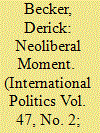

|
|
|
|
|
| Publication |
2010.
|
| Summary/Abstract |
This article is motivated by two trends in international relations (IR): the general trend toward global neoliberalism, and the discursive turn in IR scholarship. Neoliberalism, while not fully practised anywhere, has become the dominant discourse and normative measure of economic policy ideas around which policy debates coalesce. This all is the more noticeable among the lesser-developed countries. This article attempts to explain this gradual shift in the global political economy where most discussions centre around a core set of ideas and beliefs about how the system ought to function. Given that evidence of this ideational/discursive shift predates the end of the Cold War and changed out of step with the steady growth in economic interdependence, new approaches are warranted. What is argued here is that the study of social interaction among states will shed considerable light onto how the international system has developed into its current state.
|
|
|
|
|
|
|
|
|
|
|
|
|
|
|
|
| 19 |
ID:
120921
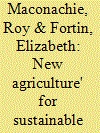

|
|
|
|
|
| Publication |
2013.
|
| Summary/Abstract |
In sub-Saharan Africa, commercial bioenergy production has been hailed as a new form of 'green capitalism' that will deliver 'win-win' outcomes and 'pro poor' development. Yet in an era of global economic recession and soaring food prices, biofuel 'sustainability' has been at the centre of controversy. This paper focuses on the case of post-war Sierra Leone, a country that has over the last decade been consistently ranked as one of the poorest in the world, facing food insecurity, high unemployment and entrenched poverty. Following a recent government strategy to secure foreign direct investment in biofuels production in agriculturally rich regions of the country, the largest foreign investment in Sierra Leone since the end of its civil war has been secured: a Swiss company is to invest US$368 million into a large-scale biofuels project over the course of 3 years, and promises to simultaneously stimulate an enabling environment for investment, provide job opportunities for youth and increase food production. For multiple actors involved in the project, the concept of 'sustainability' is crucial but accordingly there are varying interpretations of its meaning. Such differences in interpretation and the complex contradictions within discourses of sustainability are in turn framed by the various scales within which these actors are situated. While attempts have been made to manage these contradictions through global sustainability standards, the unequal power relations between different actors will ultimately determine the ways in which they are likely to be resolved. The paper concludes by reflecting on how these processes may be contributing to a changing governance landscape and wider global political economy within which bioenergy is being produced, processed and consumed.
|
|
|
|
|
|
|
|
|
|
|
|
|
|
|
|
| 20 |
ID:
075686
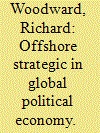

|
|
|
|
|
|
|
|